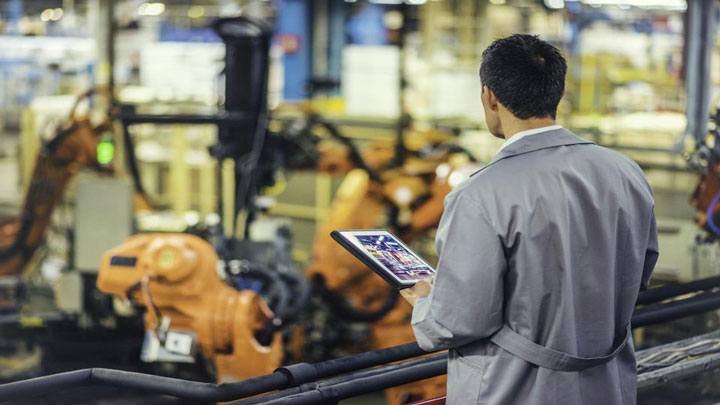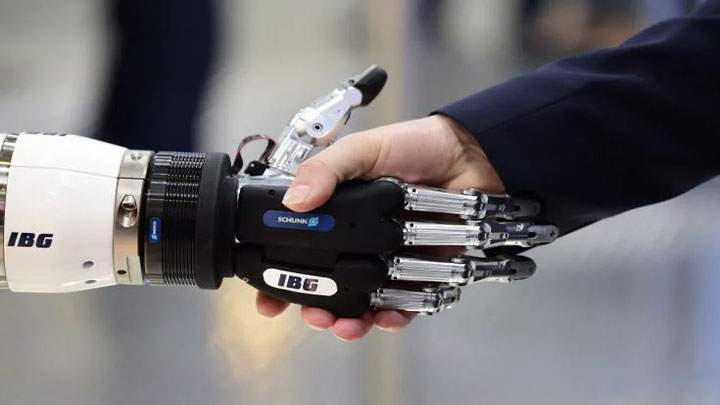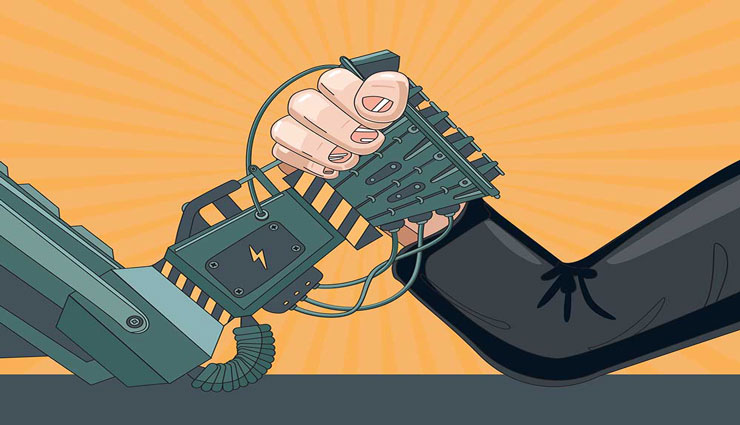These days, the topic of artificial intelligence has become popular with the introduction of chatGPT. Activists in programming, architecture, and graphic design are surprised by this program’s coding and design capabilities. For years, researchers in artificial intelligence have discussed its capacity to take over various tasks and jobs. Science fiction novelists have told stories about a world where artificial intelligence has set foot on humans for centuries. Now entering the third decade of the 21st century, will robots and artificial intelligence programs endanger our jobs? Stay with us until the end of this article to answer this question.
Will robots take our place in different jobs?
The answer to this question is not a simple yes or no. Researchers have been looking for answers to this question for several years, and their research has had different results. A famous example of this research is the Oxford University research in 2013, in which humans lost 47% of the 702 jobs examined in the study due to the emergence of automation programs and robots. It sounds like an alarming number.
Although the Oxford research pioneered in this field, it had serious weaknesses. For example, it was assumed that any job that robots can do one day would make humans unemployed; However, this does not necessarily happen in the real world. Artificial intelligence may be able to handle many tasks even now, but this does not mean that employers and organizations will wholly and immediately replace it with humans.
Other research in the following years challenged the results of the Oxford study. Researchers from the ZEW Research Institute in Mannheim, Germany, announced that only 9% of jobs would be replaced entirely by artificial intelligence. Many other jobs will use artificial intelligence to some extent, but it will not mean eliminating humans. In addition to estimating the future abilities of artificial intelligence, the researchers of this institute also evaluated factors such as age, work experience, gender, and the amount of income and university education of the employees in their research.
Which of these two pessimistic and optimistic types of research is closer to reality?
Research results of Economic Cooperation and Development Organization
After comprehensive research, the Organization for Economic Cooperation and Development (OECD) announced that robots steal only 14% of jobs from humans. This is a good number for us humans. Of course, their research has other exciting aspects. 32% of jobs will be transformed entirely with the introduction of artificial intelligence in such a way that many job duties in that profession will change. We must learn to work with AI to keep our jobs.
Which jobs are most at risk?
Despite the differences between the three mentioned studies, all three have one point in common: the extent of the threat of automation and artificial intelligence should be measured based on the nature of the job. The more repetitive and straightforward the job tasks in a profession, the more likely it is to be replaced by artificial intelligence. For example, according to Oxford University research, these jobs are more at risk:
- telemarketers;
- cleaners;
- insurance experts;
- watch repairers;
- Freight agencies and drivers;
- employees of the tax office ;
- Users of different machines such as lathes;
- accounting staff ;
- Workers and employees of manufacturing factories.
Which jobs are less at risk?
All three types of research emphasize that jobs in which creativity and human skills ( soft skills) are more visible are less likely to be threatened by the advancement of artificial intelligence. These jobs include:
- medicine, dentistry, and paramedicine;
- teaching ;
- Advocacy and judgment;
- social work and welfare;
- Firefighters and emergency technicians;
- Types of management jobs.
Although it is unlikely that jobs like these will be replaced by robots shortly, artificial intelligence is already changing many job duties in these professions. Now the question arises, what skills do we humans need to work in the future world? How can we learn the skills required to work alongside robots?
What should we do if we are worried about losing our job?

First, don’t worry; reading this article should not make you think you will lose your job. As emphasized in the Organization for Economic Cooperation and Development research, most positions will change to different degrees with the introduction of artificial intelligence. Humans are also adaptive creatures and can go along with these changes. Pay attention to the suggestions in this section to increase job security in an emerging world of artificial intelligence.
1. Learn new skills
Take the opportunity to improve your job skills, exceedingly soft skills such as teamwork, problem-solving, and management skills. These skills will increase your chances of keeping your job when an AI job is found.
Replacing artificial intelligence in some jobs is problematic because it has to be taught a large amount of data. If you have enough expertise in a field, you can show yourself as an established and expert force. Then there will be less desire to leave you. Therefore, don’t forget to take specialized short-term courses in your field.
2. Practice consistency
Like it or not, AI is changing the day-to-day things you do at work. In this process, some of your duties will be removed, and new responsibilities will be assigned to you. So it is necessary to show your organization and employer that you can adapt to new conditions. For example, suppose you have been a storekeeper of a company for several years, and now the company plans to hire a new warehouse software that works with artificial intelligence algorithms. If you do, your job security will be at risk t have the skills to work with computers and new programs and don’t desire to learn; your job is an AI contributor or supervisor.
With the arrival of artificial intelligence and robots, the need for those who can supervise them also increases. However, robots may also crash or have problems in their program. If you have enough ability and interest, you can take on new jobs that are created by the presence of these machines.
Will artificial intelligence create new jobs?

According to a study by global consultancy McKinsey, artificial intelligence may also create new jobs. These jobs will mostly be in communication technology, health and treatment, management, education, and production. Increasing consumption and income, raising the age of the planet’s population, applying new technologies, and investing in growing areas such as renewable energy production are among the reasons this institute mentions the positive role of artificial intelligence in creating new job opportunities.
Conclusion
The development of artificial intelligence, like any other phenomenon, is neither good nor bad by itself. New opportunities and challenges are created in this field, like any other phenomenon. It is essential to make the most of the options and overcome the challenges with the least cost. Part of this issue is due to the governments, which have macroeconomic and labor market policies at their disposal. What we can do is increase our job adaptability and our skills to keep up with the changes.
you write
What is your analysis of the opportunities and challenges of the development of artificial intelligence and its impact on the labor market? How do you evaluate the future of your career according to the rapid effects of technology? Please write us in the comments section.



